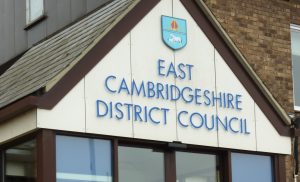Substituting for an absent colleague this morning at a meeting of the county council’s Highways & Infrastructure Committee.
I raise a question about movable speed limit signs: the council has moved towards bulk purchasing of these to reduce the cost for parish councils which apply for them. However, at the recent panel I attended to discuss parish councils’ highways applications, it was very clear that there was a huge variation in the price and specification of the mobile speed signs being applied for. It has to be one or the other – either a rather Soviet-style ‘one size fits all’ approach with the benefits of reduced cost, or flexibility to meet parishes’ individual needs in which case bulk purchasing won’t help. More work to be done on this, I think.
Then there’s a petition about making it easier to close streets temporarily for children to play out, which I speak in support of. Currently there’s a huge bureaucratic barrier to communities in Cambridgeshire seeking to close their streets for play, which might explain where there are no Playing Out streets in the county. We all agree there’s something here to be further investigated.
Next we have four questions. The first is asking for motorcycles to be allowed to use bus lanes: my colleague Cllr Ian Manning wants to know more about whether this would encourage people out of their cars and on to motorcycles (the only scenario in which this would be better for the environment), and also what the comparative carbon emissions would be.
The second and third questions are about the barriers recently installed by a private company on the guided busway pathway near the biomedical campus. Cllr Manning suggests we need a comprehensive statement from council officers on the county council’s responsibility and position, so that there is some consistency of approach. There’s also a suggestion that consultation processes need to be reviewed; and about whether a wider safety review is needed.
The fourth question is about progress on introducing coach parking permits along The Backs in Cambridge. The questioner mentions seeing thirty-two coaches arriving to park in an already fully parked-up area – and also the climate impact.
We then receive a financial update for the directorate of which Highways is a part. There’s an underspend projected of £2.7M for this year, mostly due to greater than expected income for bus lane and parking enforcement, and a reduction in landfill tax due to breakdowns at the Waterbeach waste plant. Various questions follow on issues such as concessionary fares and delays to works. I ask a number of questions:
- What is happening about the £463K increase in the costs of winter gritting under the new contract with Skanska, and how can this be addressed? (Officers advise that there is an audit currently in progress of the last two years of the contract).
- One of my parishes has suggested that the new e-permit scheme for large vans and trailers at the recycling centres may be leading to an increase in fly-tipping – how does the county council liaise about this with district councils who pick up the bill for clearing fly-tipping? (I’m advised that there is ongoing dialogue, but nothing yet to suggest that this is an issue).
- The report on tree removal and tree planting shows 110 trees removed and 159 planted in the last three years. I’m told these numbers relate only to trees planted on the highway. I ask whether it’s possible to get numbers for trees planted by the county council across Cambridgeshire in total, as tree planting is a significant part of the action we’re committed to in addressing climate change and carbon emissions.
The highways risk register passes with minimal comment.
Next there’s a report on residents’ parking permits in Cambridge. The recommendation is to leave the fees for residents’ and visitors’ permits unchanged, but to reduce the number of permits available to tradespeople from two to one. The reason for the proposal is that although only one of the two permits should be in use at any one time, in some cases this is being breached. Cllr Manning says that reducing the number of permits for all tradespeople because a few break the rules is unfair, and proposes instead that in cases where a tradeperson is using both permits at once, both should be ruled invalid. It’s agreed that this clearly needs more work, and that proposals for the tradespeople’s permit should be brought back to the committee in a few months’ time.
We receive the plan for future meetings. I’m advised that comments on the process for applications by parish councils for local highways schemes will be on the agenda for a future meeting. Then suddenly a lively discussion breaks out about the controversial new anti-terrorism barriers outside King’s College Cambridge. Meeting over at 12:45PM.


